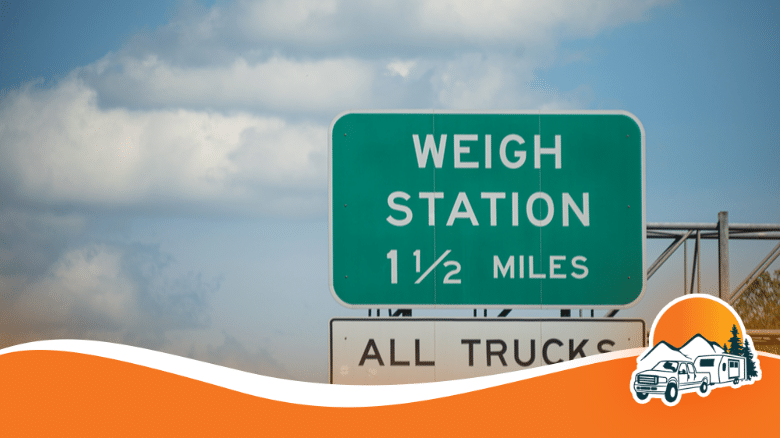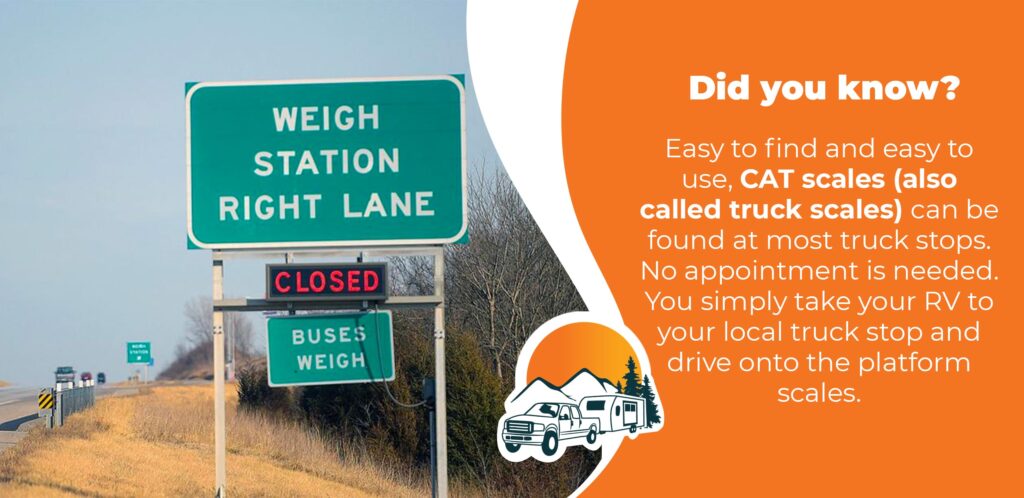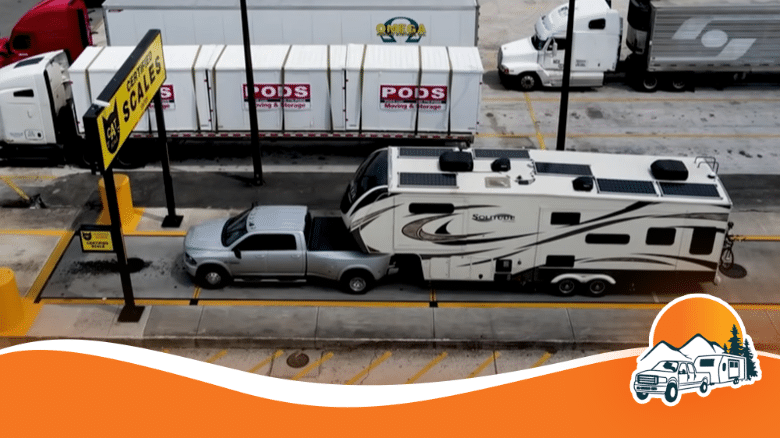All new RVers that hit the road with a large travel trailer, motorhome or 5th wheel often wonder whether they should check the weight of their RV in a weigh station. The answer to this relatively simple question can be a Yes or a No, depending on the state you are driving in and the particular laws within that state.

The answer, if we go by the legalities of the operations, is a no. However, if we were to recommend RVers the best course of action, it would be a yes.
The answer is often a yes or a no, depending on your state. As a rule of thumb, it is always best to check the state regulations that you are driving in.
What Exactly is a Weigh Station?
When driving on the interstate with your RV, you are bound to come across multiple weigh stations. These checkpoints, or weigh stations as they are more popularly known, are used to weigh the weight of all large trucks and RVs.
These checkpoints are usually located right next to the highway. Representatives of the motorway police or the Department of Transportation inspect vehicles for safety purposes.
While highway patrol and other departments would otherwise collect taxes, they now have a stringent check on RV and truck weight to ensure that they comply with state laws and regulations. Weigh stations serve an essential purpose in the grand scheme of things.
For starters, they help ensure that roads are kept intact for more extended periods and aren’t damaged by heavy vehicles operating on the interstate. Roads and bridges on the interstate tend to deteriorate faster if they are subjected to heavy weight.
Trucks that are over the regulated limit of weight can cause irreparable damage to the highway and can lead to several problems. Weigh stations do not just check the weight of the truck or RV but can also be used to check the breaks and tires of the heavy vehicle. These checks ensure that commercial vehicles comply with all local state laws.
To summarize their purpose, weight stations can be used to stop and check heavy vehicles for:
- Fuel tax collection
- Driver’s log timings
- Inspection of all DOT safety standards and regulations.
- That all papers are within the required jurisdictions.
- Possible inspection of cargo within the trucks and RV
- Compliance with all regulations laid down by the TSA
Definition of Weight
If you want to be on the safe side of things, you can rest assured if your RV weighs less than 10,000 pounds. The general term used in the United States to measure the weight of an RV is GCWR.
The GCWR is the Gross Combined Weight Rating of the RV and measures what the RV weighs in total after all the new electronics and devices have been added on board. The GCWR also includes the people on board the RV and the luggage inside.
Besides this, there are some other terms as well that can be used to define weight:
1. Unloaded Vehicle Weight
Unloaded Vehicle Weight or UVW is referred to as the dry weight of your RV. This is the weight of your RV when it is empty and doesn’t include any passengers, liquid or any other components.
2. Curb Weight
Curb weight is also known as the wet weight of your vehicle. You can calculate this by summing up the dry weight with the total of the engine fluids within the vehicle. This will include the fuel, engine oil and other liquids inside the tank.
3. Towing Capacity
The towing capacity of your RV or motorhome will measure the towables of the vehicle. The towing capacity is the total weight an RV can tow without a problem.
4. Tongue Weight
The tongue weight of the RV is the total weight of the hitch connection. Too much weight in the hitch connection can hurt the overall suspension of your vehicle, leading to a poor suspension on the road. Your goal is to achieve 10 to 15 percent of the total towable weight through tongue weight.

What Does the Law Say?
According to the AAA Digest of Motor Laws, all RVers should know numerous oddities that should be taken into perspective here.
Specific states have specific laws relating to RV travel and the states that require RV drivers to get their vehicles weighed. However, this being said, most states and their guarding authorities look the other way when an RV comes steaming by.
Almost half of the states in the United States have specific laws that relate to RVs and towing trailers. These laws state that the total weight of the vehicle and its contents shouldn’t weigh more than 10,000 pounds. Motorhomes that tow other vehicles also count. Different states have different laws relating to the total weight of the RV and what is applicable.
State Limits
As we have studied above, different states have different limits when it comes to the vehicle’s weight.
Orlando and Colorado, for instance, come with a weight limit of 26,000. An officer within these states may require you to pull over at a weigh station, and you can be fined or dealt with by the law if the total weight of your vehicle exceeds that law.
All of Maine, New Hampshire, Maine, Kansas, North Carolina, Utah, Wyoming and West Virginia do not have any legalities. Still, the officers in these places can ask you to have your vehicle weighed randomly. The weighing is done at the officer’s discretion.
Arkansas, Louisiana, Georgia, Nevada, Massachusetts and New Jersey come with different regulations about RVs and the additional weight limits. All of these states require the RV to stop if the total weight on the vehicle is 10,000 lbs or more.
Pennsylvania laws state that any vehicle can be subjected to checks. The rules do not specify the kind of vehicles that come within this check, but any recreational vehicle that appears ‘larger’ than others can be subjected to a weight check. The discretion to single out a vehicle remains with the police department.
South Dakota, Washington and Virginia have strict restrictions against recreational vehicles above the weight limit of 10,000. Commercial vehicles above the weight limit can easily pass through without being reprimanded.
Different rules apply in Canada, where any officer can pull you aside on the road, using their discretion or due to a sign on the road. The officer can have your RV weighed at a weigh station. Nova Scotia, a province in Canada, comes without any such regulation.
The laws in Canada unanimously state that any vehicle over the weight limit of 9,920 pounds or 4,500 kgs should be asked to stop or get itself weighed when asked to by a sign.
Do I Really Have to Get my RV Weighed?
The laws and legal statutes mentioned above do leave a lot of questions in the mind of the common citizen. An ordinary law-abiding citizen would want their RV to pass through different weighing stations but would also like to do so without the unnecessary hassle of going to other weigh stations. Trying to interpret the requirement can be complex and hard to comprehend at times.
Having read dozens of RV forums and participated as an authority in many more, the required modus operandi is not to stop getting your RV weighed.
Participants agreed that RV travelers aren’t required to stop at a weigh station to get themselves weighed since they aren’t driving a commercial vehicle.
Ninety-nine percent of all respondents on these platforms even believe that they don’t stop at weighing stations once pulled over. The logic is that RVs come across as recreational vehicles rather than commercial ones.
Weigh Station Protocols for RV Drivers
If your state ever asks you to stop your RV at a weigh station, you should follow a set of guidelines.
Once you are stopped at the RV station by a highway patrol member, you should start the interaction by remaining calm and composed. There are multiple reasons why RVs can be asked to stop or pull over at a weigh station.
Having experience in the industry and working with several RV drivers, we understand that certain weigh station protocols will have to be followed. You should remain pleasant with the patrol team member and stay calm and composed.
If you are stopped at a weigh station, there is something about your vehicle that has attracted the attention of the patrol police. If you aren’t at fault, it could be that an RV with features similar to yours was asked to stop at the weigh station.
If it isn’t anything else, it could be that members of the patrol police thought that your RV exceeded the provided weight limit.
While it isn’t typical for an RV to be stopped at a weigh station, you should approach the interaction easily and let the attendants guide you. You can always reach out to a weigh station beforehand and have your vehicle weighed for safety.







